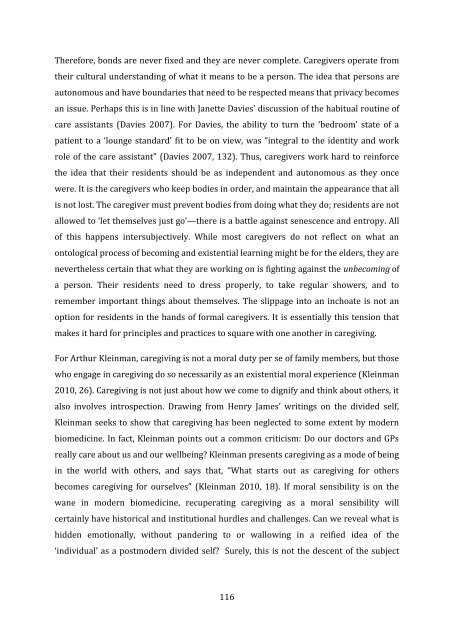Philip Y. Kao PhD thesis - Research@StAndrews:FullText
Philip Y. Kao PhD thesis - Research@StAndrews:FullText
Philip Y. Kao PhD thesis - Research@StAndrews:FullText
Create successful ePaper yourself
Turn your PDF publications into a flip-book with our unique Google optimized e-Paper software.
Therefore, bonds are never fixed and they are never complete. Caregivers operate from<br />
their cultural understanding of what it means to be a person. The idea that persons are<br />
autonomous and have boundaries that need to be respected means that privacy becomes<br />
an issue. Perhaps this is in line with Janette Davies’ discussion of the habitual routine of<br />
care assistants (Davies 2007). For Davies, the ability to turn the ‘bedroom’ state of a<br />
patient to a ‘lounge standard’ fit to be on view, was “integral to the identity and work<br />
role of the care assistant” (Davies 2007, 132). Thus, caregivers work hard to reinforce<br />
the idea that their residents should be as independent and autonomous as they once<br />
were. It is the caregivers who keep bodies in order, and maintain the appearance that all<br />
is not lost. The caregiver must prevent bodies from doing what they do; residents are not<br />
allowed to ‘let themselves just go’—there is a battle against senescence and entropy. All<br />
of this happens intersubjectively. While most caregivers do not reflect on what an<br />
ontological process of becoming and existential learning might be for the elders, they are<br />
nevertheless certain that what they are working on is fighting against the unbecoming of<br />
a person. Their residents need to dress properly, to take regular showers, and to<br />
remember important things about themselves. The slippage into an inchoate is not an<br />
option for residents in the hands of formal caregivers. It is essentially this tension that<br />
makes it hard for principles and practices to square with one another in caregiving.<br />
For Arthur Kleinman, caregiving is not a moral duty per se of family members, but those<br />
who engage in caregiving do so necessarily as an existential moral experience (Kleinman<br />
2010, 26). Caregiving is not just about how we come to dignify and think about others, it<br />
also involves introspection. Drawing from Henry James’ writings on the divided self,<br />
Kleinman seeks to show that caregiving has been neglected to some extent by modern<br />
biomedicine. In fact, Kleinman points out a common criticism: Do our doctors and GPs<br />
really care about us and our wellbeing? Kleinman presents caregiving as a mode of being<br />
in the world with others, and says that, “What starts out as caregiving for others<br />
becomes caregiving for ourselves” (Kleinman 2010, 18). If moral sensibility is on the<br />
wane in modern biomedicine, recuperating caregiving as a moral sensibility will<br />
certainly have historical and institutional hurdles and challenges. Can we reveal what is<br />
hidden emotionally, without pandering to or wallowing in a reified idea of the<br />
‘individual’ as a postmodern divided self? Surely, this is not the descent of the subject<br />
116
















